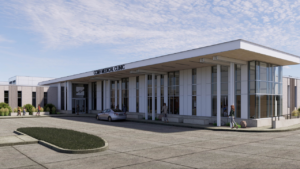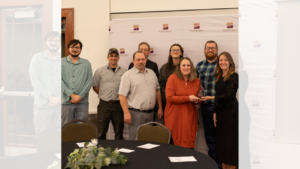Simulation in Motion-Iowa, or SIM Iowa, is a mobile education program designed to bring state-of the art clinical education to pre-hospital (EMS) and hospital professionals throughout the state using high-fidelity human patient simulators and trainers.
During a recent visit to Denison to work with First Responders, EMTs and Paramedics in Crawford County, the SIM Iowa instructors featured Jason Smith, Western Region Coordinator for SIM Iowa, along with John Hansen from Granville, Iowa and Caroline Homan, a paramedic in Storm Lake.
Smith says SIM Iowa can go anywhere.
“SIM Iowa is a self-contained unit, all in one truck. We come with our own internet, our own generator, we have everything we need. We have five high-fidelity simulation mannequins in our truck. It allows us to bring high-acuity, low-frequency situations to anyone in rural Iowa who has a need for training.”
Hansen says the use of high-fidelity mannequins provides access to equipment and training not normally available in rural Iowa.
“Because most of Iowa is rural, we help train many EMT-B level volunteer squads. SIM Iowa will go to every squad we can, no matter what level of training, and teach them how to manage emergency situations. It’s been really good for our volunteer crews to have SIM Iowa available to train our rural EMS personnel.”
As a full-time paramedic, Homan is a big believer in what SIM Iowa can bring to EMS providers.
“My first experience with SIM Iowa was in Ida Grove. They brought the truck ahead of RAGBRAI a couple of years ago. It’s used to run local EMS personnel through scenarios that might happen with RAGRAI, especially traumas and heat exhaustion. It was extremely helpful with our volunteers in Ida Grove. It got our brains moving about scenarios we might see and got us warmed up for RAGBRAI. A really wonderful experience.”
Smith agreed with that assessment. He noted the strength of SIM Iowa is to provide real-world, real-life situations, and provide the education and coaching unavailable in other settings.
“We try and make the simulations as realistic as possible. That includes highly emotional situations. The idea is that you may not have a lot of experience with that particular subject. If you’re going to mess up, we want you to mess up in here. We can all learn from the scenarios. It will help the participants know how to manage those situations perfectly in the field.”
Healthcare and EMS deserts are starting to appear in rural Iowa. Hansen says SIM Iowa helps combat that issue.
“Rural departments are struggling to keep or recruit EMS volunteers. Hence, the smaller the town, the more likely it is it will lose its ambulance service. I’m aware of communities of 1200 residents that might have to wait 15 minutes for an ambulance. If you’re having chest pain or a heart attack, having to wait for EMS can lead to a less than optimal outcome. It’s important SIM Iowa is in rural Iowa training EMS volunteers to help keep that department going. It encourages them and gets them excited about doing EMS again.”
Even as a full-time paramedic, Homan knows how difficult it is to keep up an EMS skill set.
“All EMS personnel have required continuing education hours. It’s only normal that people usually just check the boxes and get it done. Because of SIM Iowa, I learn every day from the people who come in and we’re supposed to teach them, but they also teach us. It’s beneficial for all parties involved to have a discussion about the scenarios that might happen.”
Smith says SIM Iowa is willing to go anywhere in the state to provide training.
“At the moment, we are completely grant funded so for critical access hospitals, first responder organizations, and fire departments, it is completely free for us to come out and provide high fidelity simulation training for your group or your organization.”
As an instructor for EMS personnel for over 30 years, Hansen says he has not experienced anything better than SIM Iowa.
“The fact it’s so hands-on and it’s real life training. The mannequin you’re working on can help create and visualize any scenario. We can actually have the mannequin programmed to perform in a certain way that would require a certain skill set for treatment. It makes real life training possible, in the moment, on the truck.”
The most valuable part of the training is the conversation after the completion of the simulation according to Homan.
“We go into the simulation with a general idea of what we want to accomplish in the scenario. Afterwards, we review exactly what we went over and what we could see going forward. We talk about casting a wide net taking care of your patient as you see them. It’s the after-action discussion that makes the enormous difference.”
For more information, to schedule a SIM, or to donate to support SIM Iowa, go to https://sim-ia.uiowa.edu/, or call toll free 800-WE-SIM-IA (800-937-4642).


